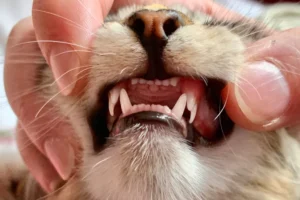Are you noticing that your cat’s gums are inflamed? Worried about what might be causing this issue and how to best address it? Let’s take a closer look at why your cat’s gums may be inflamed and what steps you can take to help alleviate this discomfort for your furry friend.
Understanding Cat Gum Inflammation
When it comes to understanding why your cat’s gums might be inflamed, it’s essential to know that gum inflammation in cats is often caused by dental issues. Plaque buildup on your cat’s teeth can lead to gingivitis, which is inflammation of the gums. If left untreated, this can progress to periodontal disease, a more severe condition that affects the tissues supporting the teeth.
Furthermore, other factors such as diet, genetics, and overall health can contribute to gum inflammation in cats. It’s crucial to regularly monitor your cat’s oral health and schedule routine dental check-ups with your veterinarian to catch any issues early on.
Symptoms to Look Out For
Ever wondered why your cat’s gums might be inflamed? Look out for signs that could indicate gum inflammation, such as red or swollen gums, bad breath, difficulty eating, excessive drooling, and blood on toys or food. Keep an eye out for these symptoms, as they can alert you to potential dental problems your cat might be facing.
In addition to visible signs, pay attention to your cat’s behavior. If they are less active or seem to be in pain while eating, it could be a sign of gum inflammation. Seek veterinary care promptly if you notice any of these symptoms to address the issue before it worsens.
Common Causes of Gum Inflammation
So, your cat’s gums are inflamed, huh? Let’s break it down for you. One common cause is dental issues like gum disease and plaque buildup. Just like us, cats can suffer from poor oral hygiene, leading to swollen and painful gums. Another culprit could be an underlying health condition such as autoimmune diseases or viral infections. These sneaky conditions can wreak havoc on your cat’s gums without you even realizing it. Make sure to keep an eye out for any signs of discomfort or redness in your feline friend’s mouth.
Importance of Dental Care
Listen up, cat parents! Proper dental care is not just for humans. Your furry friend’s oral health is equally important. Regular brushing and dental check-ups can prevent gum inflammation and other dental problems in cats. Neglecting your cat’s teeth can result in painful gum disease, tooth loss, and even systemic health issues. So, grab that feline toothbrush and start brushing – your cat will thank you later. Remember, a healthy mouth equals a happy cat!
Additional Unique Insight:
When it comes to dental care for cats, did you know that certain breeds are more prone to dental issues? Breeds like Persians and Siamese cats are known to have a higher risk of developing gum disease due to their unique dental structure. So, if you have one of these breeds, extra attention to their oral health is crucial.
Treatment Options
If your cat’s gums are inflamed, it’s essential to address the issue promptly. One of the most common causes of inflamed gums in cats is dental disease, including gingivitis and periodontal disease. To treat inflamed gums in cats, here are some options you can consider:
- Professional Dental Cleaning: Schedule a dental cleaning with your veterinarian to remove tartar and plaque buildup that can contribute to gum inflammation.
- Medication: Your vet may prescribe antibiotics or anti-inflammatory medications to help reduce inflammation and treat any underlying infections.
- Dietary Changes: Switching to a dental diet or incorporating dental treats can help improve oral health and reduce inflammation.
- Home Dental Care: Regular brushing of your cat’s teeth, using dental wipes, or providing dental chews can help prevent and manage gum inflammation.
- Regular Vet Check-ups: Schedule regular dental exams to monitor your cat’s oral health and catch any issues early on.
Remember, early intervention is key to preventing worsening gum disease and potential tooth loss in your furry friend.
Preventative Measures
No one wants to see their beloved feline friend suffer from inflamed gums. To help prevent gum inflammation in cats and promote long-term dental health, consider these proactive measures:
- Proper Dental Care: Regular brushing, dental chews, and dental diets can help keep your cat’s teeth and gums healthy.
- Regular Vet Visits: Schedule routine dental check-ups with your vet to catch any issues early and address them promptly.
- Watch Their Diet: Avoid feeding your cat too many sugary or starchy foods that can contribute to dental issues.
- Provide Dental Toys: Toys that encourage chewing can help keep your cat’s teeth clean and reduce plaque buildup.
- Stay Alert: Keep an eye out for signs of gum inflammation, such as redness, swelling, or bad breath, and take action if you notice any changes.
By taking these preventative measures, you can help keep your cat’s gums healthy and their smile bright for years to come.
Fun Facts About Cat Teeth
Did you know that adult cats have 30 teeth while adult humans only have 32? Cats have sharp, pointed teeth designed for hunting and tearing meat, while humans have flat molars for grinding food. These differences in tooth structure explain why your cat’s gums may be inflamed. The buildup of plaque and tartar can lead to gum disease, causing redness, swelling, and discomfort for your feline friend.
Expert Tips for Oral Health
To keep your cat’s teeth and gums healthy and prevent inflammation, it’s essential to establish a good oral hygiene routine. Regularly brushing your cat’s teeth with a pet-safe toothbrush and toothpaste can help remove plaque and prevent tartar buildup. Additionally, providing dental treats or toys designed to promote dental health can aid in keeping your cat’s mouth clean. If you notice signs of inflammation, such as red or swollen gums, consult your veterinarian for professional treatment options.
- Monitor Your Cat’s Diet: A balanced diet plays a crucial role in maintaining your cat’s oral health. Avoid feeding your cat sticky or sugary treats, as these can contribute to plaque formation.
- Regular Dental Check-ups: Schedule annual dental exams for your cat to catch any oral health issues early and prevent inflammation.
- Stay Consistent: Establish a regular oral care routine for your cat to ensure their teeth and gums stay healthy and free from inflammation.
Remember, maintaining good oral health is key to preventing gum inflammation in your cat. By following these expert tips and staying proactive about your cat’s dental care, you can help them enjoy a lifetime of healthy teeth and gums.
Alex, a passionate animal lover, has experience in training and understanding animal behavior. As a proud pet parent to two dogs and three cats, he founded AnimalReport.net to share insights from animal experts and expand his knowledge of the animal kingdom.




